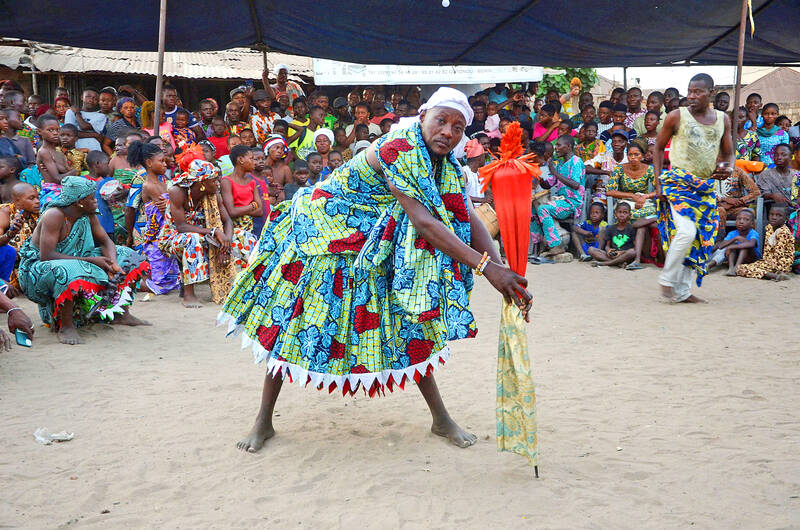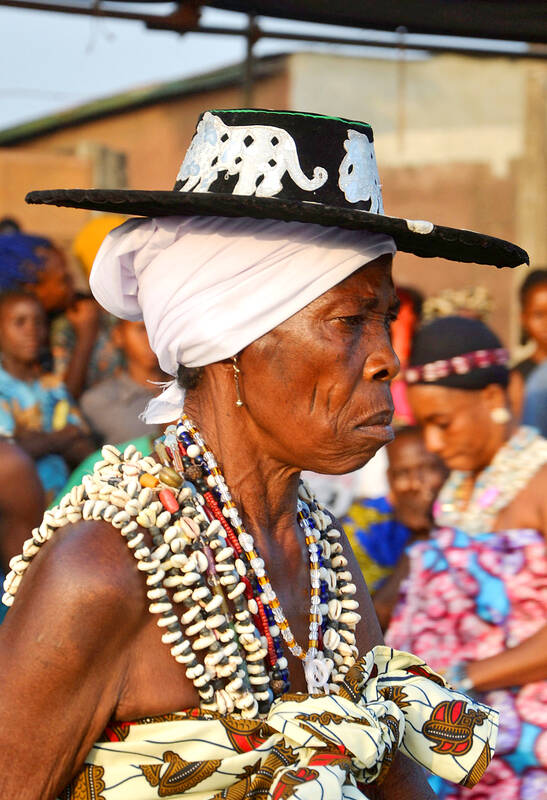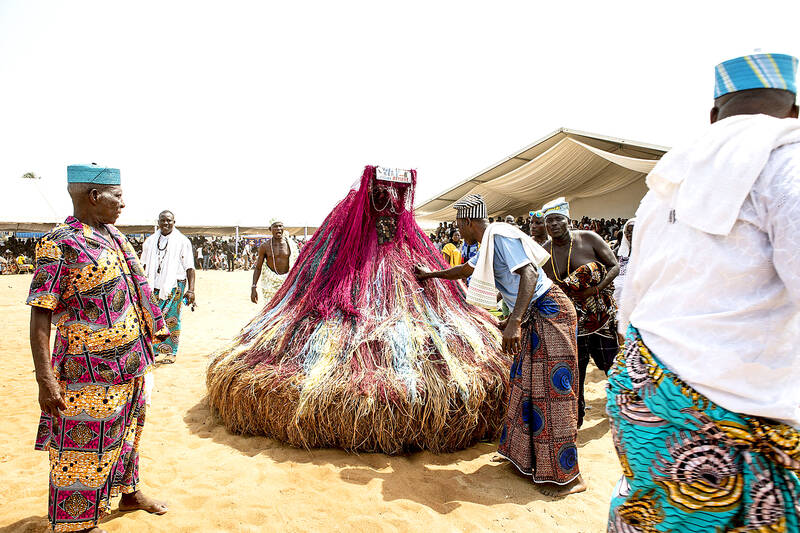Kneeling as she gazes out to sea draped in white cloth and strings of pearls, Simenou Dangnitche has just completed the final stage of her annual ritual.
Every January for the past 15 years, the 48-year-old local has joined hundreds taking part in Benin’s famed Voodoo festival.
Participants gather at the “Door of No Return,” an arch built by the beach at Ouidah in southern Benin in memory of those crammed onto slave ships bound for the New World.

Photo: Reuters
“It’s more than just a festival,” Dangnitche said. “The meeting here is a pilgrimage, a rejuvenation, a reconnection with the ancestors to hear them speak to us again.”
Voodoo, known locally as Vodoun, is a religion that worships gods and natural spirits along with respect for revered ancestors.
It originated in the Dahomey kingdom — present-day Benin and Togo — and is still widely practiced sometimes alongside Christianity in coastal towns like Ouidah, where memorials to the slave trade are dotted around the small beach settlement. This year, Dangnitche said she was “stunned by the organization and structuring of the festival.”

Photo: Reuters
Benin’s government has rebranded the event and changed the format to make the festivities more appealing to tourists in a bid to boost the country’s economy.
It opted for a two-day celebration on January 9-10 with a reorganized program in an event dubbed “Vodun Days.” According to politician Kakpo Mahougnon, chair of the Benin Vodun Rites Committee, the government is considering further extending the length of the festival.
“It’s a new way of presenting Vodoun,” said President Patrice Talon, who took part in the celebration.

Photo: AFP
‘NOTHING SATANIC’
“Our intention is to fully reveal to the world what Vodoun is and how it is practiced, to explain Vodoun and its spiritual and sociological concepts,” the president said.
“Vodoun is of economic interest to us, since tourism is an important sector,” he added.
Ouidah was given a makeover for the occasion, with several of the town’s attractions refurbished. American Christopher Swain, who said he comes every year to “recharge and reconnect spiritually,” noticed “significant changes.”
Ouidah’s public squares hosted celebrations including jazz and dancing and even the president joined in.
The religion’s 73-year-old spiritual leader Daagbo Hounon said: “We need to prove to the world that there is nothing Satanic or evil about vodoun.”
“Vodoun is about tolerance, sharing, love, generosity and peace,” he said. “Vodoun is spiritual, but it is also several arts combined, as we can see from the songs and dances of the faithful.”
Alain Godonou, one of the heads of the Heritage and Tourism Agency, said the revamped celebrations “represent a major development in the promotion of Vodoun as a real catalyst for tourism.”
They were “a way of attracting more curiosity so that people come to discover the essence of Vodoun,” he said.
As well as international tourists, the government wants to focus on domestic tourism to boost the local economy and “reveal Benin to ourselves,” as Talon put it.
He declined to give details of the budget allocated to promoting and organizing Vodoun Days to attract visitors.

Most heroes are remembered for the battles they fought. Taiwan’s Black Bat Squadron is remembered for flying into Chinese airspace 838 times between 1953 and 1967, and for the 148 men whose sacrifice bought the intelligence that kept Taiwan secure. Two-thirds of the squadron died carrying out missions most people wouldn’t learn about for another 40 years. The squadron lost 15 aircraft and 148 crew members over those 14 years, making it the deadliest unit in Taiwan’s military history by casualty rate. They flew at night, often at low altitudes, straight into some of the most heavily defended airspace in Asia.

Beijing’s ironic, abusive tantrums aimed at Japan since Japanese Prime Minister Sanae Takaichi publicly stated that a Taiwan contingency would be an existential crisis for Japan, have revealed for all the world to see that the People’s Republic of China (PRC) lusts after Okinawa. We all owe Takaichi a debt of thanks for getting the PRC to make that public. The PRC and its netizens, taking their cue from the Chinese Communist Party (CCP), are presenting Okinawa by mirroring the claims about Taiwan. Official PRC propaganda organs began to wax lyrical about Okinawa’s “unsettled status” beginning last month. A Global

Taiwan’s democracy is at risk. Be very alarmed. This is not a drill. The current constitutional crisis progressed slowly, then suddenly. Political tensions, partisan hostility and emotions are all running high right when cool heads and calm negotiation are most needed. Oxford defines brinkmanship as: “The art or practice of pursuing a dangerous policy to the limits of safety before stopping, especially in politics.” It says the term comes from a quote from a 1956 Cold War interview with then-American Secretary of State John Foster Dulles, when he said: ‘The ability to get to the verge without getting into the war is

Like much in the world today, theater has experienced major disruptions over the six years since COVID-19. The pandemic, the war in Ukraine and social media have created a new normal of geopolitical and information uncertainty, and the performing arts are not immune to these effects. “Ten years ago people wanted to come to the theater to engage with important issues, but now the Internet allows them to engage with those issues powerfully and immediately,” said Faith Tan, programming director of the Esplanade in Singapore, speaking last week in Japan. “One reaction to unpredictability has been a renewed emphasis on